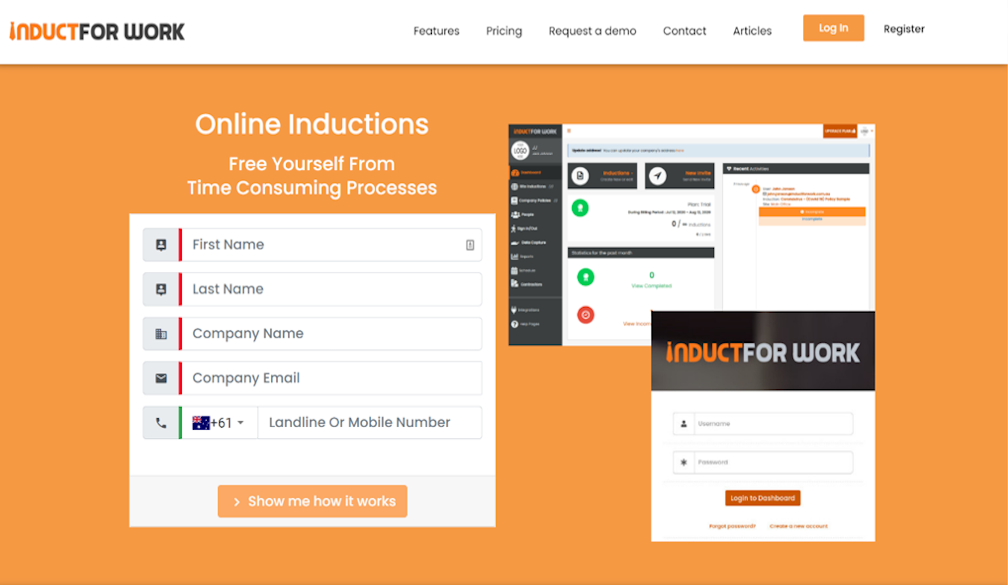Online Site Inductions for Busy HR Teams
- Written by Daily Bulletin

Induct For Work, the Australian platform for frontline onboarding and compliance, has launched Compliance Hub, a fully integrated, real-time workflow designed specifically for the fast-paced, highly mobile world of site-based work.
Built directly into the Induct For Work web platform and mobile app, Compliance Hub allows teams to complete online inductions, acknowledge policies, verify licences and tickets, and record toolbox talks the moment a person is scheduled or arrives on site—without switching between apps, chasing paper forms or losing visibility in scattered spreadsheets. Whether confirming a white card, logging an isolation talk before a shutdown or pushing an urgent policy update, Compliance Hub ensures crews can meet WHS obligations where work is already happening.
“Compliance inside site-based operations is fundamentally different from an office environment,” say system developers. “The workforces we serve are on the move across depots, farms, workshops, campuses and live events. They need fast, clear, actionable mobile workflows to do their jobs safely. With Compliance Hub we’ve built a solution that reflects that reality. It’s not just an LMS; it’s an operational tool designed to keep teams compliant and jobs running smoothly.”
Because Compliance Hub is fully embedded in Induct For Work, organisations can manage WHS artefacts with the same structure and control they apply to rostering or contractor onboarding. Leaders can define who sees what by role, site or contractor company; set minimum requirements for site entry; and ensure critical updates reach the right people at the right time—without relying on third-party tools or informal side channels. If a procedure changes, version control ensures every acknowledgement is tied to the exact policy shown. If a licence expires, reminders and access rules stop the gap from becoming a risk.
Induct For Work is releasing a premium configuration of the new workflow for organisations seeking a smarter, richer compliance experience with advanced controls and deeper platform integration next week. Compliance Hub will surface real-time clearance at a glance—who is inducted for this site, licensed for this plant, or due for a refresher—before a supervisor starts a conversation or issues a permit. It also introduces gate-ready QR checks, conditional modules by risk profile, automated refresher scheduling, advanced audit exports and connectors for HRIS, access control and incident systems. With Induct For Work’s toolbox feature, supervisors can attach photos and SOP excerpts to a talk; acknowledgements create a clean evidence trail that can be filtered by site, contractor or activity window.
“Site-based industries have been stuck using tools that were never designed for compliance at the edge,” said Jeremy Ferguson, Chief Product Officer at Induct For Work. “Inductions live in one system, licences in another, toolbox notes on paper and urgent updates in messaging threads. Things get missed. Screenshots stand in for records. It’s not just inefficient—it’s a risk, especially in high-compliance sectors like healthcare and mining. With Compliance Hub we’ve brought the essential WHS steps into the same place where work gets done. When you connect inductions, policies, tickets and toolbox actions, compliance becomes both measurable and meaningful.”
From construction to agriculture, local government to manufacturing—and increasingly recruitment, transport, event management, healthcare, TV & media, education and not-for-profits—the platform is being adopted to standardise onboarding while respecting the realities of each site. A contractor engaged by a council can receive a site induction and policy pack by SMS, acknowledge the latest version on their phone and present a QR code at the gate. A seasonal harvest crew can complete machinery and chemical handling modules in their own language the night before they arrive. A production team can push a location-specific briefing to freelancers and confirm who is cleared before the first load-in. In every case, supervisors see status at a glance and export evidence in seconds.
Operational details matter. Induct For Work ties each record to a person, place, version and time. Policy changes are tracked with effective dates; completion certificates show the exact module and version viewed. Licence and ticket records carry expiries, reminders and optional document verification. Toolbox talks capture attendance with time stamps; actions are assigned owners and due dates and are tracked to closure. For leadership and audit, dashboards group status by site, contractor company or project, while export packages assemble the chain of evidence clients and regulators expect to see.
The company emphasises that simplicity is a design principle, not a constraint. Administrators can clone modules across sites, build role-specific content from templates and schedule refreshers tied to events such as a change in procedure or a notifiable incident. Supervisors don’t need extra training; they open a talk, scan a QR code and capture the room. Workers don’t need personal numbers or extra apps; they tap a secure link, read, acknowledge and get back to work.
For many organisations, the payoff is immediate: fewer delays at the gate, fewer email chases for expired credentials and fewer gaps during audits. For frontline teams, the benefit is practical clarity—what’s changed, what’s required, and who is cleared for today’s job—delivered where they already are.
Induct For Work is available today, with Compliance Hub included in standard plans and additional features available as add-on configurations. Organisations interested in consolidating inductions, policies, licences and toolbox talks into a single, controlled workflow can request early access to advanced features and a guided setup from the Induct For Work team.








